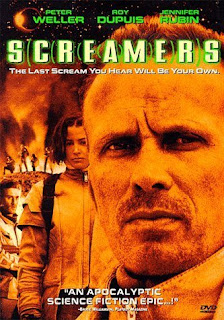
Directed by Noah Baumbach. I was so, so, so resistant to seeing this movie. I thought it was going to be like a mix of a Wes Anderson movie, a Neil Labute movie, that bad book
The Emperor's Children, and "You Can Count on Me" (which, paradoxically, I remember loving, so what's my problem?) I just found the idea of watching a bunch of yuppies unload on each other so un-fun. And I guess now that I've seen this and liked it, I should probably watch "The Squid and the Whale" like everybody says I should.
Nicole Kidman (Margot) and Jennifer Jason Leigh (Pauline) are two sisters with a poisonous relationship who should probably stay very far away from each other, but seem unable to do so. Pauline is about to get married to a sorta loserish guy, Malcolm, played by Jack Black, who, although he is far less successful than Margot at his chosen artistic pursuit, is one of the only people in the movie who seems like he would actually be fun to hang out with. Margot is a terrible person, mean to her poor tween son, critical of everybody, including herself, and unable to stop poking her nose in other people's business. Pauline is less objectionable, but I still found myself wondering why she would put up with her sister's obnoxiousness. The women are at the tail end of their sexual desirability, or at least they think of themselves as being there, and that influences their relationships with each other and with men. However, you get the sense that they may have been crazy when they were young as well, which saves the movie from being one which points fingers at addled, high-strung middle-aged women (a vulnerable demographic indeed, and one which I will inhabit within the decade or so, so I'm sensitive).
Overall, the dialogue clicks, there's enough happening without the movie being overloaded with event, and the movie, and the planned wedding, take place on an unnamed island in New England, where the family has an old beach house of the genteelly shabby type. This made me pleasantly homesick.
 We should have known, from the moment that the camera panned up Steven Seagal's body from his black boots to his black jeans to a fringed buckskin Mohicans jacket, that this thriller about oil interests in Alaska would be a terrible abuse which gives a bad name to environmentalists everywhere. I bought this DVD in Bull Moose Records on a trip to Portsmouth, NH, and got really excited by the description on the back: Seagal directed, Michael Caine starred as the evil oil company honcho, and everything looked copacetic (despite the evidence that Joan Chen starred as the Queen of the Esquimeaux - once again, Hollywood casts an Asian person as an Inuit without a blush of shame). But no, it's an awful mess. The Inuit still use dog sleds and live in some sort of skin-covered huts. They take Seagal into these huts and minister to him with Mystical Medicine, then take him on a hallucinogenic trip into the Nature World where he discovers that his true Mission is to save the Earth from evil corporate types. (The Inuit couldn't do it, because they're primitives. Der!) Seagal's spirit animal is, of course, a bear. (Nobody's spirit animal is ever a lemming or a caterpillar or something.) Joan Chen in tow, he proceeds to tear up the offending oil rig and kill the smooth-faced, duplicitous Caine. Big shocker.
We should have known, from the moment that the camera panned up Steven Seagal's body from his black boots to his black jeans to a fringed buckskin Mohicans jacket, that this thriller about oil interests in Alaska would be a terrible abuse which gives a bad name to environmentalists everywhere. I bought this DVD in Bull Moose Records on a trip to Portsmouth, NH, and got really excited by the description on the back: Seagal directed, Michael Caine starred as the evil oil company honcho, and everything looked copacetic (despite the evidence that Joan Chen starred as the Queen of the Esquimeaux - once again, Hollywood casts an Asian person as an Inuit without a blush of shame). But no, it's an awful mess. The Inuit still use dog sleds and live in some sort of skin-covered huts. They take Seagal into these huts and minister to him with Mystical Medicine, then take him on a hallucinogenic trip into the Nature World where he discovers that his true Mission is to save the Earth from evil corporate types. (The Inuit couldn't do it, because they're primitives. Der!) Seagal's spirit animal is, of course, a bear. (Nobody's spirit animal is ever a lemming or a caterpillar or something.) Joan Chen in tow, he proceeds to tear up the offending oil rig and kill the smooth-faced, duplicitous Caine. Big shocker. I would be less disappointed in this movie if we hadn't recently seen the new "Rambo," which Stallone directed and which also stars a large cast of non-Euro actors - in this case, Burmese and Thai. This "Rambo" is truly disturbing in a profoundly violent way. The evil insurgents who Rambo fights are terrorizing Burmese villages, and nobody from the outside will do anything about it. Except, of course, Rambo, who has been living in the country employed in gathering poisonous snakes for poisonous-snake fighting rings. He's convinced to intervene in the bad situation by a missionary group who really wants to help. He proceeds not to help much (it seems like the situation is pretty much FUBAR) but does manage to rescue at least some of the missionaries. Despite the fact that every time Rambo did something Rambo-esque we felt compelled to shout "RAMBO!" really loud, the movie was really something on a different level - unshrinkingly dark in its vision of the trouble that the people were living through. Definitive proof: Seagal is no Stallone.
I would be less disappointed in this movie if we hadn't recently seen the new "Rambo," which Stallone directed and which also stars a large cast of non-Euro actors - in this case, Burmese and Thai. This "Rambo" is truly disturbing in a profoundly violent way. The evil insurgents who Rambo fights are terrorizing Burmese villages, and nobody from the outside will do anything about it. Except, of course, Rambo, who has been living in the country employed in gathering poisonous snakes for poisonous-snake fighting rings. He's convinced to intervene in the bad situation by a missionary group who really wants to help. He proceeds not to help much (it seems like the situation is pretty much FUBAR) but does manage to rescue at least some of the missionaries. Despite the fact that every time Rambo did something Rambo-esque we felt compelled to shout "RAMBO!" really loud, the movie was really something on a different level - unshrinkingly dark in its vision of the trouble that the people were living through. Definitive proof: Seagal is no Stallone.






.jpg)